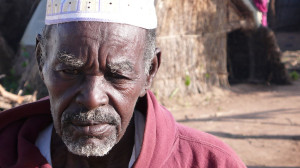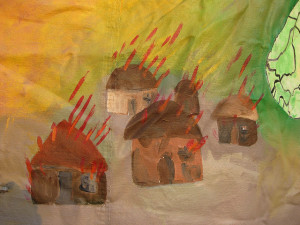Tonight Mahmood Mamdani and John Prendergast will fight to the death share a civil debate on the situation in Darfur, an event I’m hoping will end in hair-pulling and the shouting of epithets. I’ll be tweeting from the debate, and you can follow along below.
Category: sudan
Save Darfur: update
Monday’s post about why the International Criminal Court should hold off on an arrest warrant for al-Bashir left out a couple of interesting details: last Thursday, the New York Times reported that a warrant had already been issued, an announcement the ICC immediately refuted.
Practicing for the real thing? Accident? What do you guys think?
Hat tip: Kate Cronin-Furman at Wronging Rights
Save Darfur
Why the UN Security Council should stop the ICC’s efforts to indict al-Bashir
The International Criminal Court’s recent fumbled attempt to try Congolese rebel leader Thomas Lubanga Dyilo is the latest addition to a series of reasons why an ICC indictment of Sudanese president Omar Hassan Ahmad al-Bashir would be unwise.
Lubanga’s trial, which began last month after nearly three years of delays, was marred by incompetent handling of its first witness: a former child soldier who withdrew his testimony before the end of the first day, saying he had never served in Lubanga’s army and claiming that a humanitarian aid organization had told him what to say.
The witness had been promised that his identity would be kept a secret, but he took the stand in full view of those in the courtroom, including Lubanga. After he changed his story, it emerged that pre-trial judges had prevented the prosecution from witness proofing, a two-part process where lawyers can walk witnesses through the courtroom before the trial and explain procedure, and where witnesses can practice answering questions and can re-read their own prior testimonies to refresh their memories. Though different countries have different policies on witness proofing, the international criminal tribunals for both the former Yugoslavia and Rwanda and the Special Court for Sierra Leone all chose to allow it, citing its ability to prevent incidents like the one in the Hague last month.
Things are even messier in Sudan, where the ICC announced last July that it is considering indicting al-Bashir on charges of genocide, crimes against humanity and war crimes – a double first for the court, which has neither indicted a sitting head of state nor charged anyone with genocide. Moreno-Ocampo would like to charge al-Bashir with more than 300,000 deaths in Darfur and the internal displacement of nearly three million Sudanese citizens. He claims that the president ordered both Sudanese armed forces and the Janjaweed militia to attack and destroy villages belonging to three separate ethnic groups in Darfur.
What’s happening in Darfur is despicable, and al-Bashir is undoubtedly responsible – if not for instigating the violence, at least for his failure to attempt to stop it. At the same time, the ICC’s charges, if passed (a decision is expected in November), will carry little weight. Sudan has signed but not ratified the Rome Statute, the act that created the court. This means the country is not legally bound to follow any ICC directives, raising the question of who, exactly, will waltz into Khartoum and slap handcuffs on al-Bashir. When news of the potential arrest warrant broke in July of last year, the deputy foreign minister of South Africa — a country whose post-apartheid Truth and Reconciliation Commission has been praised for its success — admitted that al-Bashir would likely never be arrested and said a warrant would not help bring peace to Darfur.
Even if al-Bashir’s arrest were probable, it would not be immediate, giving him ample time to retaliate against Darfur, something both experts and aid workers in Darfur say is likely. The day after the ICC announced its intentions to investigate al-Bashir, anti-Western riots took place in Khartoum and Darfur. It’s not unthinkable that, were the indictment to become a reality, Sudan might shut its doors to international aid organizations whose presence is still desperately needed in Darfur.
The ICC has a history of missteps in Africa. Its 2005 indictments – the court’s first – of five leaders of the Lord’s Resistance Army, a Ugandan rebel group infamous for child abduction and extreme brutality, are widely blamed for disrupting the peace process in Uganda. LRA leader Joseph Kony reportedly walked out of negotiations with the Ugandan government upon learning of the warrants, and the group, which had eased its attacks in Uganda, has since launched a renewed offensive that included the massacre of nearly 1000 Congolese civilians last December.
In 2007, Ugandan president Yoweri Museveni asked the court to suspend the indictments in favor of a local justice process, hoping to encourage Kony to sign a peace agreement. Chief Prosecutor Luis Moreno-Ocampo refused, and Kony is still in hiding as his troops pillage their way through northeastern Congo.
Article 16 of the Rome Statute gives the UN Security Council the power to put the ICC’s decision on hold indefinitely for any reason. Both the African Union and the Organisation of the Islamic Conference have pressured the Security Council to invoke the article, provided al-Bashir agrees to make a good faith effort toward peace in Darfur. Suspending the prosecution, if only temporarily, would avoid increased bloodshed and would allow the ICC to work through its trial issues with Lubanga before embarking on yet another case. If the ICC’s handling of the Uganda and Democratic Republic of the Congo cases are any indication of the court’s ability to carry out their mandate in the best interests of African conflicts’ victims, the Security Council should comply.
Crossposted on The Morningside Post and The Huffington Post (albeit with a disappointing typo in the title)
Sudan and the ICC: please change my mind
I spent yesterday morning collaborating with the tireless John Liebhardt, the multitalented Elia Varela Serra and a handful of other Global Voices authors on a global round-up of bloggers’ reactions to the International Criminal Court’s recommendation that Sudanese president Omar Hassan al-Bashir be indicted on multiple counts of genocide, war crimes and crimes against humanity. Now that I’ve read through other bloggers’ reactions, I’m ready to add my own thoughts.
Warning: this is the worst kind of blog post, born of a late-night argument that no one won, the self-serving kind that blames and complains without offering any solutions. It’s been one of those days.
I have a love-hate relationship with the ICC that’s mostly hate (caveat: it’s so easy to criticize, sitting here on my couch with my coffee). It sounds great in (surface-level) theory: an international tribunal established to prosecute criminals of the worst sort. It’s noble. It appears to fulfill the world’s moral responsibility to victims of large-scale evil. It’s an attempt to atone for the Holocaust, Rwanda, the Balkans and all those other times we said “Never Again.” The ICC does all it can under its mandate, and it works hard to identify the worst human rights abuses in the world and find enough evidence to support a case against them. In practice, though…eeesh.
When the ICC issued arrest warrants for Lord’s Resistance Army leader Joseph Kony and four of his top commanders in July 2005…nothing happened. Well, two of them died, but I don’t think that’s related. Kony demanded immunity, President Museveni backpedaled like crazy and human rights activists in northern Uganda labeled the warrants an obstacle to peace. Three years later, negotiations are still stalled, Kony and his two remaining commanders are still in the bush, and despite the headlines every once in a while claiming peace is imminent, the LRA and the government aren’t any closer to signing an agreement than they were five (or ten) years ago.
Is what’s happening in Darfur despicable? Absolutely. Is al-Bashir responsible? Without question. But what purpose are the ICC’s charges going to serve? As I said in the Global Voices round-up, Sudan has signed but not ratified the Rome Statue, the treaty that created the ICC. This means they’re not legally bound to follow any ICC directives, so who, exactly, is going to waltz into Khartoum and slap handcuffs on al-Bashir? And if someone does, who’s going to govern Sudan while he’s sitting in The Hague? The likelihood is that any move the ICC makes is going to make al-Bashir even more angry, and that anger will probably be taken out in Darfur.
So what can we do? At the risk of sounding like a Kaplanite, I don’t know if there’s anything we can do. If anyone feels up to writing a rebuttal, à la this guest post in response to my earlier, misinformed rant about the Juba peace talks, please do. I’d love to be corrected by someone who has a much better knowledge of the workings of the ICC and the situation in Sudan.
Update: For an elegant, researched critique of the International Criminal Court in Africa, check out “Africa’s unjust deserts” by Stephanie Nolen, writing for The Globe and Mail.
GVO: African bloggers react to ICC charges against Sudanese President al-Bashir
My next piece, co-written with John Liebhardt, is up at Global Voices Online:
Bloggers from around the world are reacting to the International Criminal Court’s recent decision to charge Sudanese President Omar Hassan al-Bashir with multiple counts of genocide, war crimes and crimes against humanity. Many of those bloggers are criticizing the indictments, claiming they are difficult to enforce and that they will bring more unrest to an already unstable nation.
Featured in this round-up are Too Huge World, Sudanese Thinker, Sudan Watch, Emmanuel Abalo, Codrin Arsene, Nairobi Notebook, The Angry African, Victor Ngeny, Chris Blattman, Ugandabeat, Gay Uganda, Making Sense of Darfur, Daniel Sturgis and Ali Alarabi.

